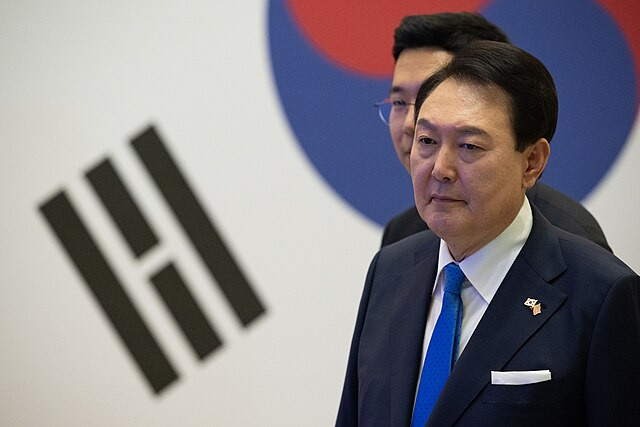South Korea's ongoing political crisis escalated on Tuesday as investigators probing President Yoon Suk Yeol's controversial martial law declaration were denied entry to the presidential office for a second time. The standoff occurred amid mounting political division and uncertainty over the Constitutional Court's upcoming decision on whether to reinstate or remove Yoon from office.
The Corruption Investigation Office for High-ranking Officials (CIO), along with police investigators, waited for seven hours outside the presidential office, seeking access to computer servers and phone records related to Yoon's decision to declare martial law on December 3. The office's security staff refused them entry, Yonhap News reported. A previous attempt to raid the premises on December 11 also ended unsuccessfully, with the office opting to voluntarily submit some data instead.
The raid attempts are part of a broader investigation into the legality of Yoon's short-lived martial law, which was reversed just hours after parliament voted to overturn it. Yoon's decree had brought hundreds of troops to encircle parliament, an act reminiscent of South Korea's military-backed dictatorship era. Lawmakers from both sides of the aisle condemned the move, and opposition-controlled parliament swiftly impeached Yoon last Saturday.
Prime Minister Han Duck-soo, now acting president following Yoon's suspension, sought to calm international concerns on Tuesday. Presiding over a Cabinet meeting, Han stated that he will "continuously do my utmost to inform the international society that the Republic of Korea is fast regaining stability and maintaining confidence with partners." He also called for swift implementation of the 2025 budget to stabilize South Korea's slowing economy.
Despite Han's reassurances, the political landscape remains deeply fractured. The Constitutional Court, tasked with deciding Yoon's fate, faces its own challenges. The nine-member court currently has only six sitting justices after three vacancies went unfilled. For Yoon to be formally removed, six justices must vote in favor of impeachment, effectively requiring unanimity under the current configuration.
The opposition Democratic Party, which led the impeachment effort, has vowed to expedite the appointment of three new justices to ensure what it calls a fair and impartial ruling. However, Yoon's ruling People Power Party (PPP) has pushed back, arguing that Han lacks the authority to appoint justices while serving as acting president.
"An acting president can appoint Constitutional Court justices when there is a presidential vacancy, but not when the president's duties are just suspended," said PPP floor leader Kweon Seong-dong, a vocal Yoon supporter. Kweon's stance has inflamed tensions, with Democratic Party spokesperson Jo Seoung-lae dismissing the objection as "absurd and utterly nonsensical."
Legal experts remain divided on the issue. Kim Jung-won, secretary general of the Constitutional Court, told lawmakers on Tuesday that an acting president is permitted to appoint justices, as no legal provision prevents it. Still, the deadlock over appointments adds yet another layer of uncertainty to Yoon's impeachment trial, which could take up to 180 days to resolve.
Meanwhile, Yoon has maintained a low profile since his impeachment. Investigative authorities have reportedly struggled to contact or summon him for questioning regarding allegations of rebellion and abuse of power. Seok Dong-hyun, a lawyer representing Yoon, rejected accusations of insurrection on Tuesday, stating Yoon's martial law decree "did not constitute insurrection" and that Yoon would "confidently express his position in the Constitutional Court."
The political turmoil has sparked widespread protests across South Korea, with many citizens calling for Yoon's immediate removal. His approval ratings have plummeted, reflecting public outrage over the unprecedented use of martial law. Yoon's defense minister, police commissioner, and senior military officials have already been arrested for their involvement in the decree's enforcement.
Analysts note that Yoon's potential dismissal could have lasting consequences for South Korea's conservatives. "If Yoon is ousted, the conservatives face a high risk of losing a by-election to the liberals," said one political observer, drawing parallels to the fallout from former President Park Geun-hye's impeachment in 2017. Park, a conservative leader, was removed and arrested following a corruption scandal, paving the way for a liberal presidency.
The Democratic Party's leader, Lee Jae-myung, is widely favored in polls to win a presidential election if Yoon is unseated. However, Lee himself faces legal troubles that could derail his candidacy should his recent conviction for election law violations be upheld.




